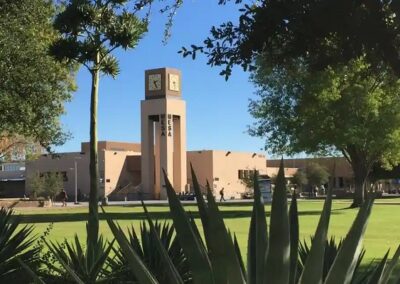Study in the USA
The USA is the most popular international study destination in the world, attracting more overseas students than any other country.
This enigmatic nation is a world leader in finance and commerce and the political decisions made here have a bearing on the world as a whole. America exerts a huge influence on contemporary global culture. It is ethnically diverse and multicultural, having been shaped by settlement and mass migration.
A vast nation of fifty states, each one of those states has something different to offer an international student. From picturesque rural towns to vibrant, bustling cities, from small colleges to huge universities, the United States has something to suit everyone.
US educational institutes offer state of the art facilities and excellent resources. A US education is based on quality and flexibility and will enable you to realise your own American Dream.
In the USA, there are various types of institutes in the higher education system. State universities and private universities offer undergraduate and postgraduate degrees. State universities have lower tuition fees than private universities but the class sizes are larger.
Community colleges offer two-year associate degree programs whilst technical or vocational colleges prepare students for a particular industry.
Technical and vocational colleges offer technical and vocational programs designed to prepare students for work in a particular industry.
There is an English language program for you in the US whatever your level. Studying English here will give you the chance to speak with native English speakers every day.
Types of Institutes and Courses
The higher education system in the USA is extensive and varied. State universities and private universities offer undergraduate and postgraduate degrees. State universities have lower tuition fees than private universities but the class sizes are larger.
Community colleges offer two-year associate degree programs whilst technical or vocational colleges prepare students for a particular industry.
Technical and vocational colleges offer technical and vocational programs designed to prepare students for work in a particular industry.
English language schools offer various English language programs.
Only education providers that are certified by the Student and Exchange Visitor Program are authorized to accept international students in the United States. For a full list of certified institutes and their contact details, you can visit the Study in the States school search page Study in the States school search page.
Visa & Entry Requirements
How to Apply
There are several application options in the US but it is standard procedure to apply directly to your chosen education provider. Each institute’s entry requirements can differ greatly so make sure you fully check the requirements on the provider’s international admissions website.
Visit this section of the Education USA website for more information on applying
Entry Requirements
Visas
There are different types of visas for non – US citizens who want to study in the United States.
F1 Student Visa is the most common visa for international students. It is for those who wish to study at an accredited college or university in the US or study English at a university or intensive English language institute.
F2 Exchange Visa is for those students who will be participating in an exchange program, including those programs that provide high school and university study.
F3 Student Visa is for those students who will be engaged in non-academic or vocational study or training in the United States.
For more information on the visa process visit http://www.travel.state.gov
Working While Studying
If you have a J-1 visa, with permission from your visa sponsor you are entitled to work on-campus whilst studying in the USA.
With an F-1 and J-1 visa you can also take up volunteer work off-campus, providing that you do not receive any form of compensation (wages, salary, tips, bonuses or any other kind of benefit) for your work. Also, you must not be displacing a US worker by taking over a position that was previously a paid post.
After your first year of study, you may apply for permission to work off-campus for up to twenty hours a week if you have an F-1 or J-1 visa. However, there is no guarantee that your request will be granted.
For further updated information, please visit http://www.travel.state.gov.


